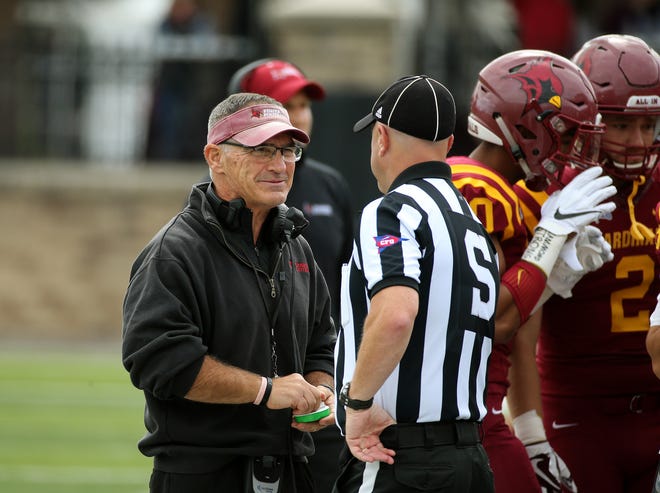The ’90s Kids: English and Athletics Discuss Their Time at Fisher
Nearing the end of our Fisher 75 series, we focus on a group of faculty and staff that joined the community in the 1990s. We interviewed English Professor Deborah VanderBilt, Head Football Coach Paul Vosburgh, and Academic Director of the First Generation Scholars Program Richard Dejesús-Rueff. Read on to learn more about Dr. VanderBilt and Coach Vosburgh, and keep an eye out for the final piece highlighting Dr. Dejesús-Rueff.
Deborah VanderBilt, Professor of English, 1990:

Dr. Deborah VanderBilt came to St. John Fisher University in the fall of 1990. When she visited for the first time, she had never set foot in New York State before. Growing up in Japan and moving to the midwest, this was a new journey, but she felt certain that she could find her place at Fisher.
VanderBilt was introduced to the Fisher community by Doug Howard, who had been in the English department since 1980 and was the current chair. She met Howard at a conference, where he then interviewed her about a possible position. “It was the force of his personality, how nice he was,” VanderBilt said of Howard’s impact on her decision to come to the college. “He promised that Fisher was the kind of institution that really matched my own values, which he saw from my application. And everybody says that, but I will say that when I visited, it really was true.”
When she came to Fisher after accepting his offer, the student population was less than 1,500 and the institute lacked any graduate programs. In some ways, this impacted VanderBilt’s decision to teach at the institution, knowing that she would be able to have greater interpersonal connections with her students and colleagues. “Fisher was really the kind of place that I’d always imagined teaching in and it really was what it had been represented to be,” she said.
Part of this small-school experience allowed more community events on campus. Thinking back on some of the most memorable activities, she remembered Students With a Vision, a volunteer club on campus led by Service Scholars. Events such as sleeping out on the quad while raising money for homelessness or going to paint classrooms in the city school district were open to anyone hoping to make a difference in their community. “They didn’t want the community engagement events to be limited to people who had a professional job to do it. They just wanted things to be open, and they would organize, and it was really cool,” VanderBilt said.
For events more local to the English department, she remembered many special guests hosted on campus, including poet Gwendolyn Brooks and author Chinua Achebe. During such talks, members of the larger Rochester community gathered at the school. “That’s always fun, when Fisher is the place to have the community come for these great cultural events,” she said.
Thinking of events like these talks may remind current students of the Cavanaugh Lecture series, a biannual tradition that hosts authors on campus. But not all students will be aware of the man honored by these lectures, Rev. John R. Cavanaugh.
As one of the last priests from the original Fisher faculty, VanderBilt described Cavanaugh as, “the most genial man.” She amended, “although, maybe not to students. He had a stamp that said ‘I quit.’ He would stop [reading a paper] when he had reached his limit of grammatical errors,” She laughed at the memory. “Well, times have changed. […] He was so fun to be with, and the statue of him with bagpipes really does capture him like he was,” she said.
The lecture series started solely in the English department, without any real funding. After some money was left to Fisher, the department combined with the Religious Studies department to build up the series into what it is today.
As well as the people she remembers from her own department, VanderBilt spoke fondly of Fr. Joe Lanzalaco, a Vietnam Veteran who worked in campus ministry. “He was a priest who made it clear that people were his priority,” she said. “He spoke up for domestic partnership rights at Fisher, he did silly things like blessing the feet at Teddi, he hammed it up. To me, that face of Catholicism, that representation of Catholicism was important. Because he wasn’t inclusive in every way, but he was inclusive in many ways that were very meaningful to students here and to faculty like me, who are not Catholic. So, he was part of Fisher’s journey to become the inclusive place I know it is still striving to be.”
Reflecting on Fisher’s constant attempts to grow as a more inclusive campus, she drew attention to the different social environments of graduate and undergraduate students at the university. “[Getting graduate students involved] took some effort–and it’s still happening, in my opinion–to just make sure that this is a campus that really is inclusive to every kind of student who goes here. I think we still primarily think of ourselves as an undergraduate institution and not really a university, yet.”
“That’s probably just a journey we’re on,” she finished.
Paul Vosburgh, Head Football Coach, 1991:

“I came here in 1991,” Coach Paul Vosburgh said. “I took over the job in August, just a few weeks before the season even started.” He’s been at Fisher ever since, with all four of his children graduating from the institution. Some of his family went on to get graduate degrees at Fisher, including his wife. In that time, this Fisher family has seen the small college blossom into the university it is today.
While the size of the campus has changed and Vosburgh has seen an increase in his team numbers (from about 45 to almost 145 players), he said the most noteworthy difference is the increase in facilities. “When I first got here, we really didn’t have very much,” he said. “The weight room we have now and the locker rooms we have now weren’t here. This stadium was not here. We played on a grass field in the back. It wasn’t really a great football facility. In fact, one time we had to sump pump the field to get the water off of it.”
Starting out on this small scale, Vosburgh sees a direct correlation between improved facilities and a larger, more connected, team. He believes seeing the campus and the athletic center on tours has a major impact on students’ decision to attend the university.
Asked about the most memorable games over the years, Vosburgh says he still remembers their first win. “When I got here, we didn’t win a game the first year,” he said. “And then, the next year, we opened up with Catholic University out in D.C. and they were a very good team, they had gone 9 and 2 the year before. That was our first recruiting class, as a staff, and we ended up beating them…I think we beat them 17 to nothing, or something like that, which was a big win for our guys.”
Even before facility improvements started, Vosburgh saw some big wins that showed the team some promise. “That first win over Catholic was big, and if you look back at the first time that we ever beat Brockport, or the first time we ever beat Ithaca…those are always big wins for your program,” he said. “You’re a start-up program, and then you’re beating some of the established programs. So those are all big wins, too.”
In terms of the larger Fisher community’s connection to the team, Vosburgh says attendance has never been an issue. In fact, Fisher has been nationally recognized as one of the top schools in the country for game attendance. “One year, I think we finished third or fourth in the country for attendance at our home games,” he said.
Close proximity and connection with the Buffalo Bills has been helpful for Vosburgh’s staff and team. “When the Bills first came here, they did hire one of my assistant coaches to help run the camp,” he said, although clarifying that he doesn’t work at the camp himself. “We’ve always been able to utilize the Bills. […] We get to go on the sidelines with them during practice, going to all the practices, we’ve even been invited to meetings with [the players], learning from them.”
“I just hope they continue to grow,” Vosburgh said of his hopes for the future. “We’re like any other business. Unless you keep adding to it, and try to make it better, it will go backwards. You either get better or you get worse.”
Help support the next group of Courier writers!












